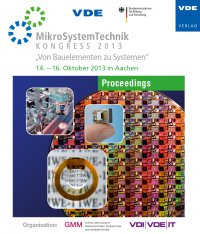Rapid Immunodiagnostic Kits based on proprietary 1-step chemistry for covalent and leach-proof antibody immobilisation
Konferenz: Mikrosystemtechnik 2013 - Von Bauelementen zu Systemen
14.10.2013 - 16.10.2013 in Aachen, Deutschland
Tagungsband: Mikrosystemtechnik 2013
Seiten: 4Sprache: EnglischTyp: PDF
Persönliche VDE-Mitglieder erhalten auf diesen Artikel 10% Rabatt
Autoren:
Vashist, S. K.; Czilwik, G. (HSG-IMIT - Institut für Mikro- und Informationstechnik, Georges-Koehler-Allee 103, 79110 Freiburg, Germany)
Stetten, F. von; Zengerle, R. (HSG-IMIT – Institut für Mikro- und Informationstechnik, Georges-Koehler-Allee 103, 79110 Freiburg, Germany )
Inhalt:
We have developed a novel chemistry for the 1-step immobilization of antibodies on solid-substrate bioanalytical platforms. It enables the development of rapid immunodiagnostic (ID) kits that are analytically superior to the commercial ID kits using conventional antibody immobilization procedure. The developed chemistry is low-cost as it simply involves the dilution of capture antibodies in a particular concentration of 3-aminopropyltriethoxysilane (APTES), which is in fact cheaper than the phosphate buffered saline. It enables the leach-proof covalent binding of capture antibodies in just 30 min, which is >20-fold and >4-fold more rapid than the conventional (used in commercial ID kits) and our previously developed immobilization procedures, respectively. The immobilization chemistry was employed for the developed of rapid ID kit, based on sandwich enzyme-linked immunosorbent immunoassay (ELISA), to detect human Creactive protein (hCRP) in the dynamic range of 15.6-4000 pg/mL. The developed ID was very highly-sensitive and can detect the entire pathophysiological range of CRP in human serum after appropriate sample dilution. The developed chemistry has very high commercial potential as it will enable the development of very highly-sensitive ID kits for clinical, industrial and bioanalytical applications.


